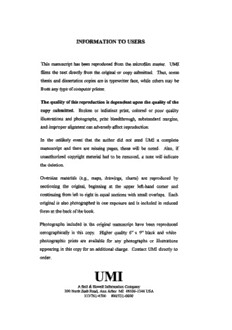Table Of ContentINFORMATION TO USERS
This manuscript has been reproduced from the microfilm master. UMI
films the text directly from the original or copy submitted. Thus, some
thesis and dissertation copies are in typewriter face, while others may be
from any type of computer printer.
The quality of this reproduction is dependent upon the quality of the
copy submitted. Broken or indistinct print, colored or poor quality
illustrations and photographs, print bleedthrough, substandard margins,
and improper alignment can adversely afreet reproduction.
In the unlikely event that the author did not send UMI a complete
manuscript and there are missing pages, these will be noted. Also, if
unauthorized copyright material had to be removed, a note will indicate
the deletion.
Oversize materials (e.g., maps, drawings, charts) are reproduced by
sectioning the original, beginning at the upper left-hand comer and
continuing from left to right in equal sections with small overlaps. Each
original is also photographed in one exposure and is included in reduced
form at the back of the book.
Photographs included in the original manuscript have been reproduced
xerographically in this copy. Higher quality 6” x 9” black and white
photographic prints are available for any photographs or illustrations
appearing in this copy for an additional charge. Contact UMI directly to
order.
UMI
A Bell & Howell lofonnation Company
300 North Zed) Road, Ann Aibor MI 48106-1346 USA
313/761-4700 800/521-0600
s CHUR F un c tio n s, J uggling, and
S tatistics on S huffled P erm utations
DISSERTATION
Presented in Partial Fulfillment of the Requirements for
the Degree Doctor of Philosophy in the Graduate
School of The Ohio State University
By
Jonathan Stadler, B.S.
* * * * *
The Ohio State University
1997
Dissertation Committee:
Approved by
Dr. Stephen C. Milne, Adviser
Dr. Thomas A. Dowling
‘'Y ïu X ^
Dr. Dijen Ray-Chaudhuri
Adviser
Department of Mathematics
ÜMI Number: 9801794
UIVU Microform 9801794
Copyright 1997, by UMI Company. AH rights reserved.
This microform edition is protected against unauthorized
copying under Title 17, United States Code.
UMI
300 North Zeeb Road
Ann Arbor, MI 48103
© Copyright by
Jonathan Stadler
1997
A bstract
This dissertation is a work in the area of algebraic combinatorics. The results of
this dissertation are influenced by papers of Stanley (1971), Foata and Désarménien
(1985), and Ehrenborg and Readdy (1995). Two new proofs of Stanley’s ShuflSing
theorem appear; one analytical and one bijective. Also given is a bijection between
newly-defined “colored” permutations and tableaux which are found in Foata and
Désarménien. This bijection leads to a generalized version of Simon Newcomb’s
problem. Finally, juggling patterns are defined which are enumerated by a product of
specialized Schur functions, a special case of which is the juggling patterns described
by Ehrenborg and Readdy.
Given an integer partition A, we define a generalized ç-binomial coeflBcient .
We also define n(A) = %](z — l)Aj. One of the major results of this dissertation is
interpreting the coefficients A[A, A:] in the following generalized Worpitzky identity.
/V-l x + k t X
E /IK. fc] _—- iTTl
N A(')
fc=0 1=1
Here, A = (A(^\ A(^\ ..., A^‘^) is a sequence of partitions and N = |A(')|. The right
hand side of this identity is a product of specialized Schur functions. We say that
11
r is a shuffling of two permutations a and tt if cr and tt appear as subsequences in
T. The coefficients j4[A, /:] ç-count (via lesser index) the number of shufflings of t
specialized permutations which have k descents.
It is the above identity which motivated most of this thesis. While seeking
a recurrence relation for the A[A, A:], we were able to reprove Stanley’s Shuffling
Theorem in two different ways. One proof uses combinatorial and analytical means
for the q = I case and the other is a bijective proof of the ç-analogue, mapping a
shuffled permutation r of <r and tt to a pair of stars and bars arrangements (A%. .4g).
Finally, since the permutation statistic of descents has been used in the study
of juggling patterns, it was natural to enumerate juggling patterns by [% T" J , a
i=l
product of a modified form of specialized Schur functions. A special case allows us
to provide a bijective proof of a theorem of Haglund on compositions of vectors.
Ill
To my entire family. For tremendous support throughout my undergraduate years,
I dedicate this to my parents. And for the dedication to me throughout my
graduate work, I dedicate this to my wife, Ellen, who now knows more about
combinatorics than she ever could have hoped.
IV
A cknowledgments
First, I wish to thank Dr. Stephen C. Milne for all of the advice, encouragement
and instruction that he has provided. Dr. Milne’s guidance has been extremely
beneficial in far too many aspects to list here.
I also wish to thank the members of my committee not only for their assistance in
relation to this dissertation, but for previous instruction. It was Dr. Ray-Chaudhuri
who gave an exam question that first piqued ray interest in Eulerian numbers. Dr.
Dowling provided me with the opportunity of sharing some of my research with him
through reading hours.
Thanks also goes to Dr. George Andrews and to Dr. James Haglund for consul
tations with respect to the material of this thesis.
V ita
December 19, 1969 ...........................................Born - Columbus, Ohio
May 1992 ............................................................B.S. Mathematics Education, Bowling
Green State University
1992-present ......................................................Graduate Teaching Assistant, The
Ohio State University
Fields of Study
Major Field: Mathematics
Studies in:
Basic Hypergeometric Series Dr. Stephen C. Milne
Combinatorial Enumeration Dr. Stephen C. Milne
VI

